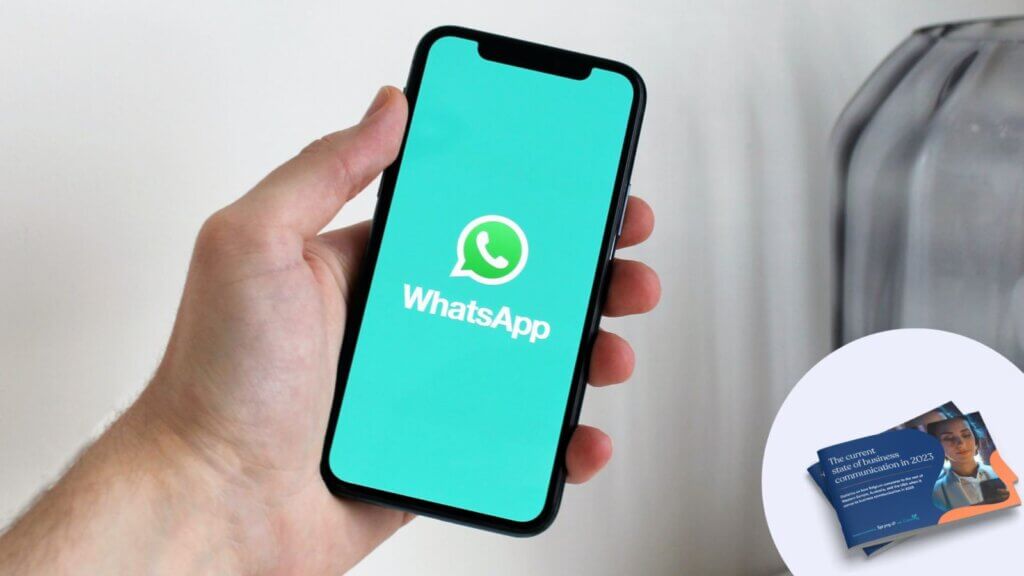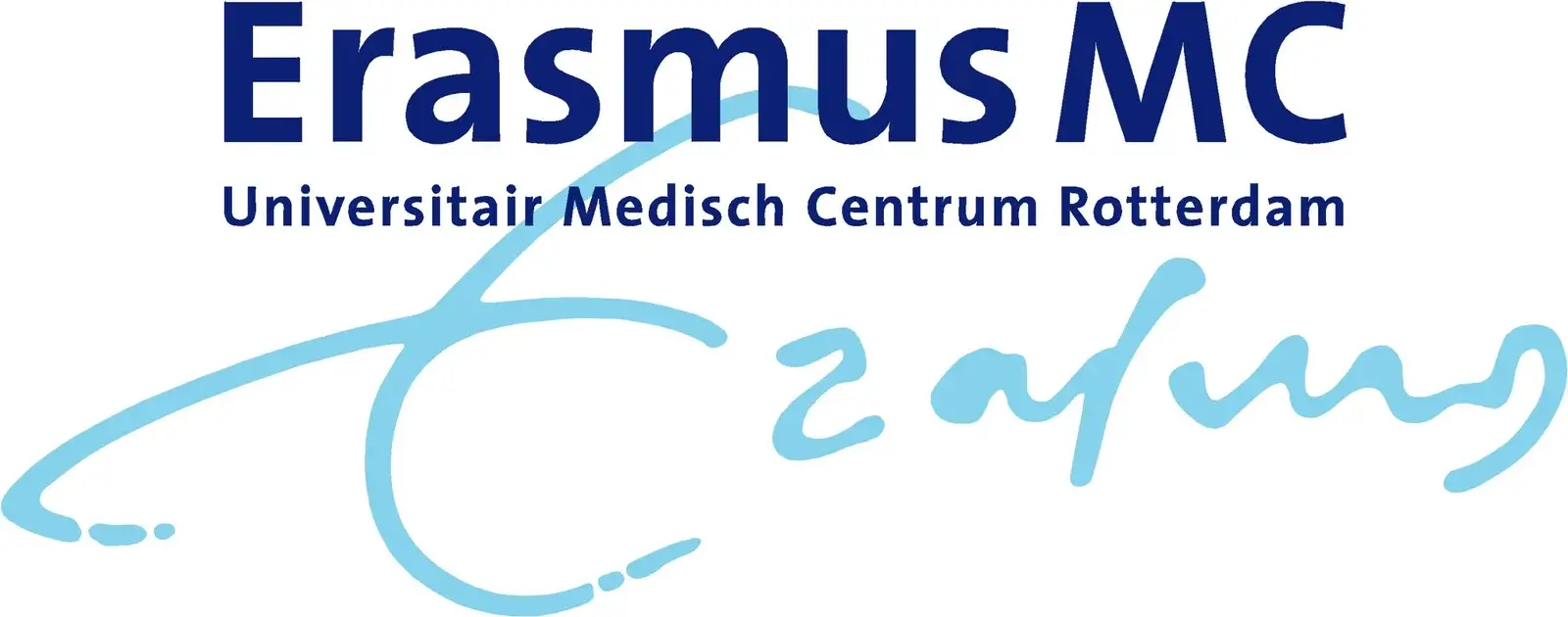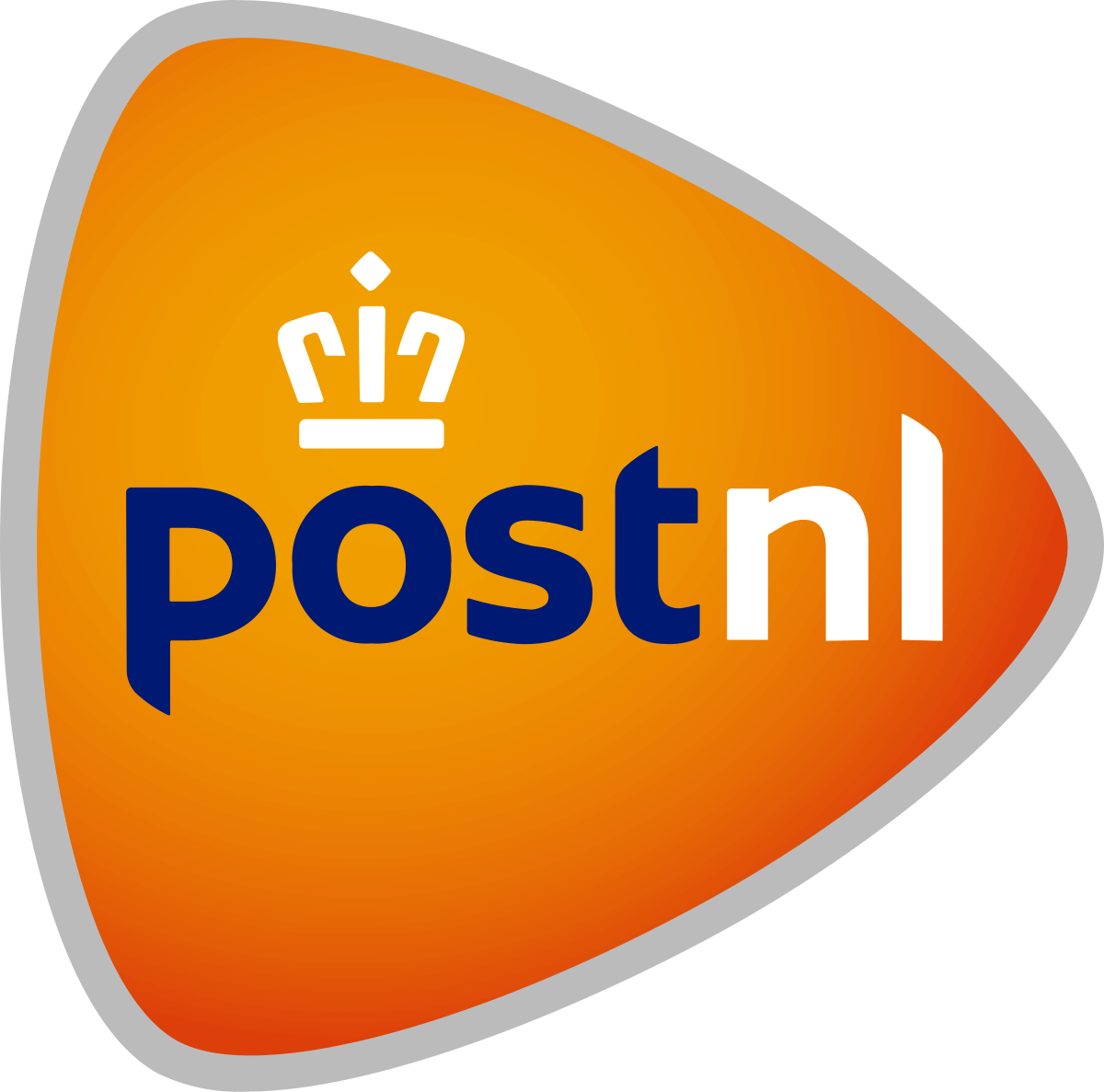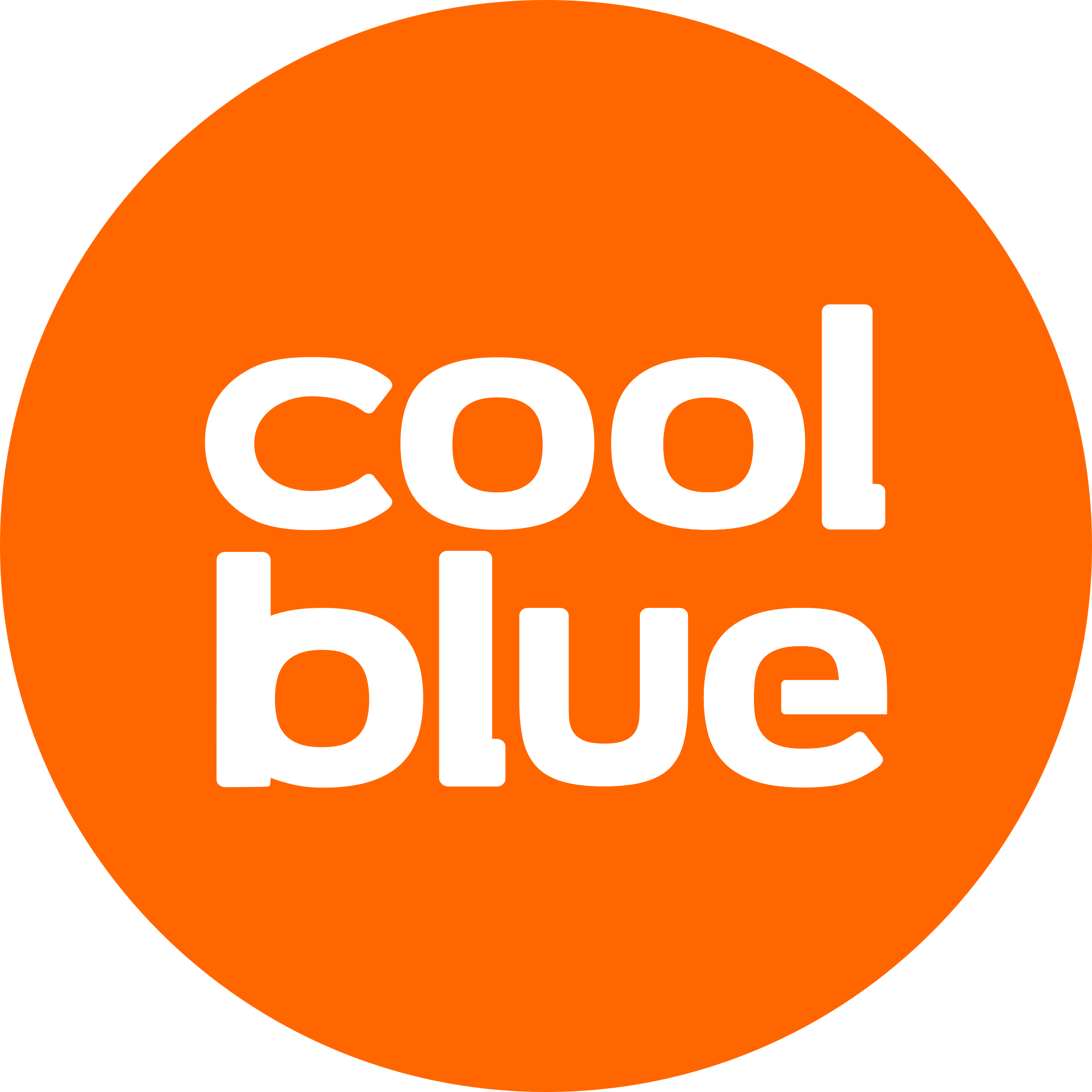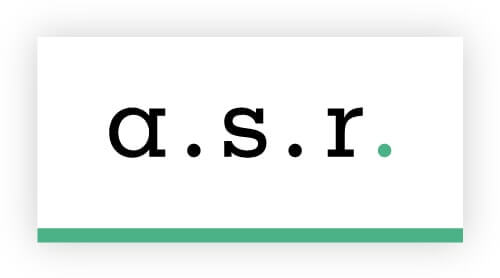WhatsApp, a widely recognized messaging application predominantly used for personal communication, holds a hidden aspect that most people don’t use to its full capacity, a feature known as “WhatsApp for Business”. The feature functions as a channel through which organisations can foster direct communication with their clientele while ensuring safe communication with the company. This feature not only guarantees a profound sense of trust but also actively encourages customer engagement.
In the ever changing world of business communication, it can be hard to determine how often, on what platform and how much information should be communicated. It is advised to avoid over- and under-communication. Customers should be informed of certain information that is relevant for them, to have the best possible experience with the company.
This article will provide you with valuable insights on leveraging WhatsApp messaging for your business, in conjunction with other communication channels like SMS, to create a customised blend of channels that best suit your specific needs.
Use cases for WhatsApp for your business
It is especially important to keep the balance in mind when it comes to relatively new means of communication channels, such as WhatsApp. WhatsApp is a well known messaging app, where two parties can communicate with each other simultaneously, conducting two way communication. To find out more about consumers’ needs and preferences when it comes to receiving communication through WhatsApp, Spryng in collaboration with Commify has conducted extensive research. The results are presented in this article. Respondents were asked the question: Would you be happy to receive the following from businesses via WhatsApp?
Delivery information via WhatsApp for Business
According to the survey people are the most interested in receiving delivery information through WhatsApp messaging. Using the messaging app is beneficial for both the consumer and the logistics/ delivery departments, since by allowing the two parties to communicate live, it facilitates the delivery and ensures that the delivery arrives at a time and place that is convenient for both parties.
Appointment reminders via WhatsApp for Business
The second most popular communication initiative by organisations to customers is appointment reminders. Receiving appointment reminders via SMS has proven to decrease the “no-show” problem by 70%, which saves a significant amount of time and revenue for businesses all around the globe. The reason behind why SMS is so effective when it comes to reducing the amount of missed appointments is its extremely high opening rate, 98% to be exact. Not only that, but 90% of SMS are open within the first five minutes of it being delivered. The same statistics hold true for Whatsapp (14 WhatsApp Business Statistics That Will Blow Your Mind, n.d.), which gives us insight on why these two communication channels are so popular.
Not only does receiving appointment reminders help businesses with optimising their communication and workflows, but it also aids customers in arriving in time and to remember to show up to their appointments. On average, 69,2 % of the participants are open to receive appointment reminders through WhatsApp, supporting the previous claim that it is deemed to be beneficial for both the organisation and the consumer.
Payment reminders via WhatsApp for Business
The third most common use case was payment reminder messages. Nowadays most bills are paid online, either through an app or a website. This allows customers to handle their bills more efficiently from the comfort of their own home, however this method also carries the risk of forgetting to pay them. To solve this problem a great alternative is to send payment reminders to avoid any delays or unnecessary discomfort.
That being said, slightly more participants stated that they would still prefer to receive these notifications through SMS, possibly, because it is more “visible” than any other messaging apps, meaning it’s more likely that they will see the message due to its high opening rate of 98%.
Why should organisations use WhatsApp for Business?
Though SMS is an effective platform to communicate with customers, it only allows back and forth communication between the parties if the business uses a virtual phone number. In the case of an organisation opting for WhatsApp, now there is a solution to use the app as a more professional way to communicate with clients, called WhatsApp for Business. WhatsApp for Business is an excellent way to use the app, while being verified as a business account creating a comfortable and trusting environment for the customers to communicate with. Not only that, but through this option, your business can shift the majority of its customer service tasks as well as marketing and ecommerce possibilities, using the channel customers already use to provide service and share personalised offers.
According to our research WhatsApp is an effective channel for marketing campaigns and conversational commerce, for nearly 50% of the respondents wish to receive promotional messages. With that being said, a new opportunity for brands arises to advertise their products on a broader scale.
Are you interested in learning more about communication needs and trends? The full research report will be downloadable for free soon.
What reasons would customers like to be contacted for through WhatsApp for Business
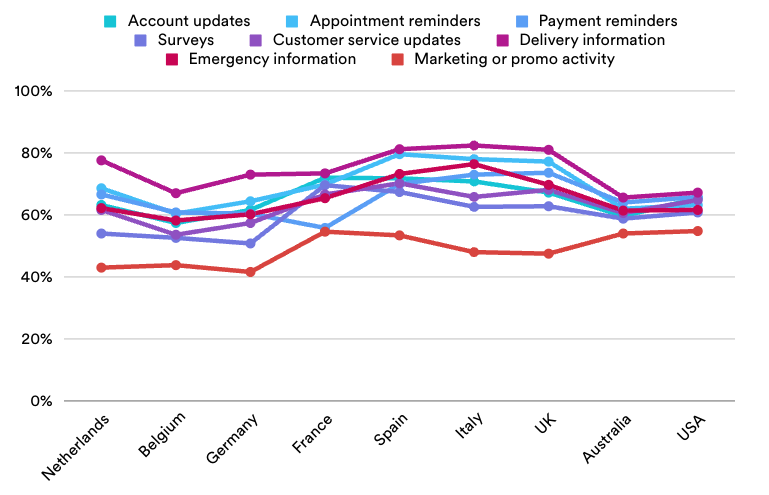
Combining communication platforms: the omnichannel approach
Even though WhatsApp and SMS were compared in the previous sections, it does not mean that they are mutually exclusive. Using one channel does not mean using the other would be a waste of resources of time, since both have their advantages and disadvantages, as well as they are both used for different purposes most of the time. Varying several communication channels yields better results in terms of visibility and accessibility. Most consumers stated in our survey that they prefer to have more than one channel to communicate on.
As an example, you could combine SMS and WhatsApp for Business through a delivery. You can send the delivery appointment time slot in advance using SMS, once the appointment is registered as done, you could send an SMS as a follow up, containing a survey and/ or a link to your WhatsApp channel, where it is possible to elaborate on the feedback given in the survey or converse about the delivery appointment in the case of a change in delivery time or any other request/ question.
Another use case for WhatsApp for Business is marketing campaigns. According to our research nearly half of the respondents (49%) are open to receiving marketing/ promotional messages through WhatsApp, which might not seem like a lot, but in comparison to other forms of marketing it is one of the highest. This might be the case because WhatsApp messages tend to be more personalised and it allows to continue a conversation between the business and the customer.
With WhatsApp for Business you can send messages in bulk, including rich media, which allows you to send more personalised messages with aesthetically pleasing visuals.
The app is increasing in popularity amongst marketeers, not only because of the previously mentioned reasons but also because WhatsApp has an opening rate of 95% skyrocketing over email 21.5% (What Is Email Open Rate?, 2020). This means that the same content that would be sent over email can be sent over WhatsApp, but reach more than 4 times the amount of people you would reach using email. However this implies that the tone and style of the messaging should be less commercial and adjusted to the channel, to achieve the best results.
Most loved incoming messages: Appointment reminders
As previously mentioned, appointment reminders have become a well working system in consumers’ incoming messages. This phenomenon prompts us to delve deeper into the realm of notification preferences, especially in a world overwhelmed with daily alerts, with the ever present fear of missing crucial appointments. In response to this, consumers have found solace in the simplicity and reliability of SMS notifications.
Unlike emails, which often drown in overflowing inboxes teeming with marketing messages and spam, SMS messages have proven to capture consumers’ attention more efficiently. An astonishing 98% of SMS messages sent in 2023 are promptly read, with most recipients responding within a mere five minutes of receipt.
Interestingly, preferences for appointment reminders vary across regions. In Belgium, consumers express a strong inclination for email notifications, but what’s intriguing is that a significant portion of this demographic also favors SMS reminders. This trend is not unique to Belgium; it resonates across Europe. In countries like the UK, USA, and Australia, SMS has triumphed as the preferred medium for receiving appointment reminders. In a world where digital communication channels abound, SMS has emerged as the steadfast guardian of time-sensitive notifications, earning the trust and preference of consumers far and wide.
Are you interested in learning more about communication needs and trends? The full research report will be downloadable for free soon.
Through which means of communication do people prefer to get appointment reminders
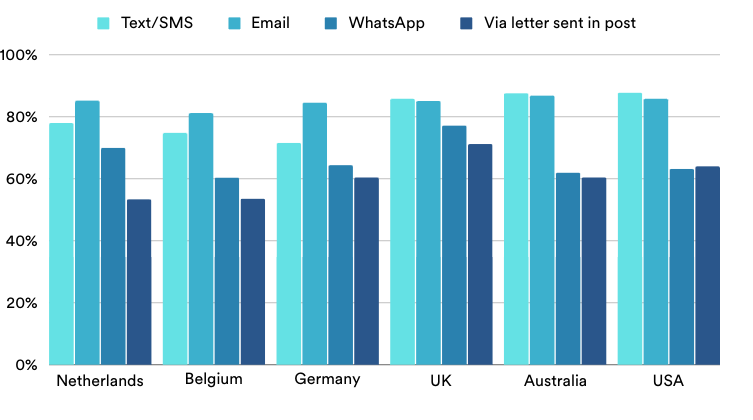
Conclusion
In conclusion, WhatsApp for Business is an important tool to use for businesses that are aiming to diversify their communication channels and optimize their communication services. This feature allows for easy and convenient communication between organizations and customers.
Our research has unveiled key use cases for WhatsApp for Business, that are the top priorities for clients: appointment reminders and delivery information, this holds true for SMS notifications as well. Both services have been proven to be effective when it comes to reducing “no-shows”, due to their exceptionally high opening rates.
Appointment reminders through SMS have gained immense popularity due to their efficiency in capturing consumers’ attention. SMS messages have a 98% read rate, and most recipients respond within five minutes. This notification preference trend extends across regions, with SMS emerging as the favored medium for appointment reminders in various countries, providing reliability and trust in a world filled with digital communication options.
The omnichannel approach is also emphasized, as WhatsApp and SMS aren’t mutually exclusive. Combining them can yield better results in terms of visibility and accessibility. Consumers prefer having multiple channels to communicate on, and businesses can use SMS and WhatsApp in tandem for various purposes, such as combining delivery notifications with feedback opportunities.
Moreover, businesses have a compelling reason to adopt WhatsApp for Business. It offers a professional, verified account that enhances customer trust, streamlines customer service, and opens up marketing and e-commerce possibilities. Nearly 50% of respondents are open to receiving promotional messages through WhatsApp, creating new opportunities for brands to reach a broader audience.
In conclusion, WhatsApp for Business is a powerful tool for modern businesses looking to enhance customer communication, streamline operations, and tap into new marketing possibilities. By understanding consumer preferences and adopting an omnichannel approach, businesses can harness the full potential of WhatsApp and SMS to create better customer experiences and drive growth.
Sources:
What is email open rate? (2020, August 7). Campaign Monitor.
14 WhatsApp Business Statistics that will blow your mind. (n.d.). https://m.aisensy.com/blog/whatsapp-statistics-for-businesses/#:~:text=Messages%20on%20WhatsApp%20have%20a,for%20your%20business%20marketing%20%26%20support.

